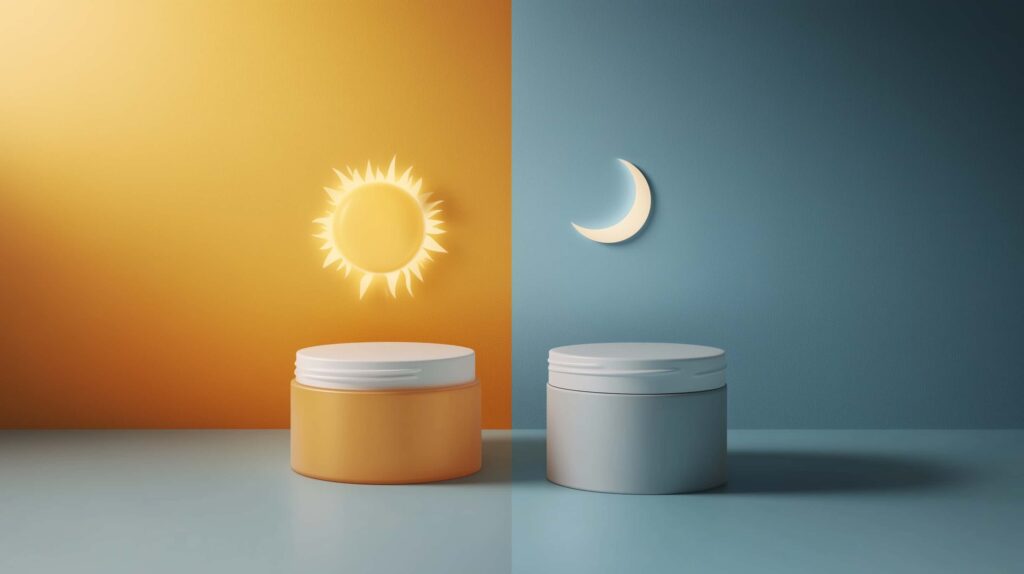Day Cream vs. Night Cream: Why You Need Both
Are you wondering why your skincare routine feels incomplete, even after applying a cream every morning and night? If you’ve ever been puzzled by the need for both day and night creams, you’re not alone. Many people assume that one product can do it all, but the truth is, your skin has different needs as the day goes by. In this article, we’ll explore what makes day creams and night creams unique, why combining them can transform your skin, and exactly how to integrate them into your daily routine for the best results. Whether you’re battling environmental stressors or looking for a way to nurture your skin while you sleep, understanding the science behind these creams will empower you to make informed decisions that truly benefit your skin. Let’s dive into the world of dual skincare and unlock the secrets to a glowing, healthy complexion.

What Are Day Creams?
Day creams are specifically formulated to protect and hydrate your skin during the daytime. When you step outside, your skin faces a barrage of environmental aggressors—from UV rays to pollution—which can lead to premature aging and dullness. Here’s what you need to know about day creams:
Purpose: They act as a barrier, shielding your skin from harmful external elements. Many day creams include SPF to protect against UV rays, making them essential for preventing sun damage.
Key Ingredients: Look for antioxidants like vitamin C and E, hyaluronic acid for hydration, and lightweight moisturizers that won’t clog your pores.
Benefits: Day creams help to keep your skin moisturized, reduce fine lines caused by sun exposure, and improve overall skin texture. They provide a smooth base for makeup, ensuring that your skin looks radiant throughout the day.
Texture & Application: Typically, day creams have a lighter texture than their night counterparts. This allows for quick absorption, ensuring that your skin feels fresh without any greasy residue.
Imagine your day cream as a suit of armor for your skin. It’s designed to work actively during the day, protecting and preparing your skin for any challenges that come its way. With a blend of protective and hydrating ingredients, day creams not only enhance your skin’s appearance but also support its natural barrier function. This makes them a must-have for anyone looking to maintain healthy, resilient skin in a busy, urban environment.

What Are Night Creams?
Night creams, on the other hand, are formulated with the understanding that your skin enters repair mode when you sleep. While you’re catching up on rest, your skin is hard at work regenerating cells and repairing damage accumulated during the day. Here’s a closer look at night creams:
Purpose: Night creams are all about repair and deep hydration. They work to replenish moisture, reduce the appearance of fine lines, and stimulate cellular regeneration.
Key Ingredients: These creams often contain ingredients like retinol, peptides, and ceramides, which are known to boost collagen production and support skin renewal. Richer emollients and nourishing oils are also common to provide long-lasting hydration.
Benefits: Using a night cream helps in minimizing visible signs of aging, fading dark spots, and enhancing overall skin texture. They are designed to work slowly over time, delivering noticeable improvements with consistent use.
Texture & Application: Night creams typically have a thicker consistency compared to day creams. This heavier formulation allows them to form a protective layer on your skin, locking in moisture and active ingredients while you sleep.
Think of your night cream as a restorative potion that supports your skin’s natural healing process. While you’re asleep, your body is in its prime state for recovery, and a good night cream helps maximize this natural repair mechanism. By investing in a quality night cream, you’re giving your skin the best chance to recover from daily stressors, making it look refreshed and rejuvenated come morning.

Why You Need Both: The Science & Benefits
Using both day and night creams is like giving your skin a tailored, around-the-clock treatment. Each cream plays a specific role that addresses your skin’s changing needs throughout the day. Let’s break down the science and benefits behind this dual approach:
Complementary Roles:
Day Creams: Provide protection and hydration during exposure to the elements. They focus on preventing damage from UV rays, pollution, and free radicals.
Night Creams: Focus on repair and regeneration, offering deep nourishment while you sleep. They work to repair any damage incurred during the day and boost cell turnover.
Enhanced Effectiveness:
By addressing both protective and restorative needs, you create a synergistic effect that optimizes the health and appearance of your skin. For example, antioxidants in your day cream can neutralize free radicals, while the retinol in your night cream encourages collagen production and cell renewal.
Long-Term Benefits:
Consistent use of both products can lead to a more resilient skin barrier, reduced signs of aging, and improved overall skin texture. The dual approach ensures that your skin remains hydrated, balanced, and well-protected at all times.
Scientific Backing:
Studies have shown that skin regeneration is most effective at night. Meanwhile, protecting your skin during the day is crucial in preventing the breakdown of collagen and elastin due to environmental stressors. Using a specialized product for each phase maximizes these benefits.
Imagine your skincare routine as a 24-hour care plan for your skin. During the day, your skin is like an active worker facing challenges head-on; it needs a protective shield. At night, it transforms into a repair center, diligently restoring and renewing itself. By combining both creams, you ensure that your skin receives the right care at the right time, leading to visible improvements in texture, tone, and overall vitality.

How to Incorporate Both into Your Skincare Routine
Integrating both day and night creams into your skincare routine doesn’t have to be complicated. Here’s a step-by-step guide to help you make the most of these products:
1. Morning Routine:
Cleanse: Start your day with a gentle cleanser to remove any impurities.
Tone: Use a mild toner to balance your skin’s pH.
Apply Day Cream: After your moisturizer (if using one) and any serums, apply your day cream evenly over your face and neck. Ensure it contains SPF or follow up with a sunscreen for added protection.
Layer Makeup: If you wear makeup, let the day cream absorb for a few minutes before applying it.
2. Evening Routine:
Cleanse Thoroughly: Use a cleanser to remove makeup, pollution, and other residues. Consider double cleansing if you wear heavy makeup.
Exfoliate (2-3 times a week): Light exfoliation helps remove dead skin cells, allowing your night cream to penetrate better.
Apply Night Cream: After cleansing (and toning if you prefer), apply your night cream. Focus on areas that need extra hydration and repair, like around your eyes and mouth.
Optional: Use a facial oil or serum for added nourishment if your skin is particularly dry or in need of extra repair.
3. Additional Tips:
Consistency is Key: For the best results, use both creams consistently. It may take a few weeks to notice visible changes, so be patient.
Adapt to Your Skin Type: If you have oily or acne-prone skin, choose non-comedogenic formulations that won’t clog pores.
Listen to Your Skin: Your skin’s needs can change with the seasons and your lifestyle. Adjust your routine accordingly, perhaps using lighter formulas in the humid summer and richer ones in the dry winter.
By following these steps, you can easily create a routine that protects, repairs, and nourishes your skin all day long. The goal is to build a simple, effective regimen that fits seamlessly into your busy lifestyle, ensuring that you wake up with refreshed, revitalized skin every day.

Common Misconceptions and FAQs
There are several myths surrounding the use of day and night creams that can leave you confused about the right approach to skincare. Let’s clear up some common misconceptions and answer frequently asked questions:
Myth 1: One Cream Is Enough
Fact: A single cream cannot address the distinct needs of your skin throughout the day. Day creams focus on protection, while night creams emphasize repair and regeneration.
Myth 2: Night Creams Are Just Heavy Moisturizers
Fact: While night creams are richer, they are specifically designed to support the skin’s natural repair process. They contain active ingredients like retinol and peptides that help boost collagen production.
Myth 3: You Don’t Need Sunscreen if Your Day Cream Has SPF
Fact: While many day creams include SPF, it’s important to ensure you’re getting adequate protection, especially during prolonged sun exposure. If needed, supplement with an additional layer of sunscreen.
FAQ: Can I use the same product for both day and night?
Answer: Although some products are marketed as all-in-one solutions, they typically do not offer the specialized benefits that dedicated day and night creams do. For optimal results, it’s best to use separate formulations.
FAQ: How long does it take to see results?
Answer: Consistent use over a period of 4-6 weeks is generally needed to notice significant improvements. However, some benefits, such as improved hydration and smoother skin texture, can be noticed sooner.
FAQ: Are these creams suitable for all skin types?
Answer: Yes, there are formulations available for every skin type, including sensitive, oily, and combination skin. It’s essential to choose products that are non-comedogenic and appropriate for your skin’s specific needs.
By debunking these myths and answering your questions, you can approach your skincare routine with confidence. Remember, understanding the science behind these products helps you make better decisions for your skin’s long-term health.

Final Thoughts & Action Steps
In summary, using both day and night creams offers your skin a comprehensive, round-the-clock care routine that protects, repairs, and nourishes it. By integrating a light, protective day cream and a rich, restorative night cream into your routine, you’re setting yourself up for a healthier, more radiant complexion.
Action Steps:
Evaluate Your Current Routine: Consider how your skin feels during the day and night.
Choose the Right Products: Look for formulations that suit your skin type and lifestyle.
Be Consistent: Stick to your routine for at least a month to observe noticeable improvements.
Share Your Experience: Engage with others and share your skincare journey in the comments or on social media.
Embrace this dual approach and take the first step towards a more confident, glowing you. Your skin deserves the best care every hour of the day, and with the right routine, you can achieve a natural, healthy radiance that truly stands out.







